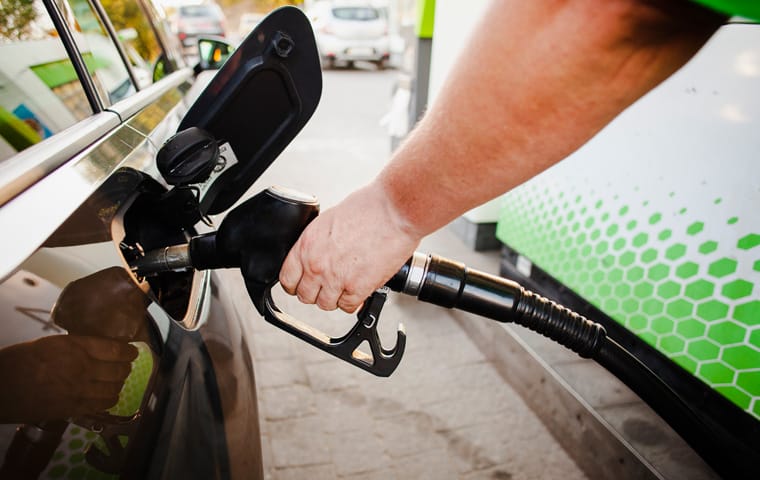Introduction
When calculating the average fleet’s total cost of ownership, fuel is generally the second biggest expense after depreciation. If you were to calculate the operating costs of the average fleet, you’d find that, on average, fuel makes up 60% of its operating budget. Managing fuel consumption is critical to keeping fleets’ budgets in line.
In this article, we will define and explain how to calculate fuel consumption. We will also highlight factors that affect fuel consumption, including:
- Load weight
- Speed and aerodynamics of the vehicle
- Vehicle wheel alignment and tire pressure
- Driver behavior
Additionally, we will explain how fleet tracking software can help fleets reduce their fuel consumption; monitor, train, and reward drivers; and streamline route planning.
What is Fuel Consumption?
Fuel consumption is a measurement of the amount of fuel used up driving a given distance. The formula for fuel consumption is fuel used per distance traveled. The lower the value, the more fuel-efficient the vehicle.
In the United States, fuel consumption is measured in gallons per 100 miles. In Europe and other parts of the world, it is measured in liters per 100 kilometers.
How to Calculate Fuel Consumption
In order to calculate fuel consumption, you’ll need some basic data on your vehicle’s most recent trip. You should record the number of miles driven and how much fuel was used to travel that distance.
To calculate these numbers, start with a full tank, reset your odometer, and drive until you use up a portion of the fuel. Then, return to the gas station and fill your tank back up to full. The amount of fuel you put in is how much was used to travel the distance recorded on your odometer.
The formula to calculate fuel consumption is miles driven divided by gallons of fuel used. For example, let's say you traveled 300 miles using 50 liters of fuel. To calculate your fuel consumption you would divide the distance traveled —300 miles— by the number of gallons of fuel used—50. This would give you 6.
Factors Affecting Fuel Consumption
Fuel consumption is affected by a number of different factors. Many of these factors can be controlled by fleets but some cannot. Understanding these factors can help fleets better pinpoint sources of superfluous fuel consumption
Load Heaviness
The weight of your vehicles’ loads will affect their fuel consumption. A truck carrying a heavy load will use up more fuel than that same truck with a light load. According to the Automotive Fleet, every 200 pounds of additional weight reduces fuel efficiency by one mile. The weight of your vehicle also affects fuel efficiency, and lighter trucks are generally more efficient.
Driver Behavior
The driving behavior of fleet vehicle operators has a big impact on any vehicle’s fuel consumption. Bad driving habits like aggressive driving, harsh braking, speeding, and idling increase fuel consumption.
Vehicle Wheel Alignment and Tire Pressure
If your fleet vehicle’s wheels aren’t in alignment, there’s an increase in total drag on the motor vehicle, which increases fuel consumption. If even one wheel is out of alignment, it will increase drag and therefore fuel use. In addition, tires that are not inflated properly can increase fuel consumption.
Vehicle Speed
A fleet vehicle’s aerodynamics and speed have a significant impact on fuel consumption. According to the U.S. Department of Energy, every vehicle hits its ideal fuel economy at different speeds; however, gas mileage generally decreases quickly at speeds over 50 miles per hour (mph). Speeding increases fuel consumption unnecessarily.
Aerodynamics
A vehicle's aerodynamics affect its drag. The drag of a vehicle increases exponentially as its speed increases. The less drag a vehicle produces the less fuel it requires.
Additional Factors
There are other factors that can affect fuel consumption, including ambient temperature, weather, road surfaces, and hilly areas. However, these factors are generally out of the fleet’s control.
How Fleet Tracking Software Can Help Fleets Reduce Fuel Consumption
Fleet tracking is a powerful tool that can assist fleet managers in a number of ways, and reduced fuel consumption is one of these many benefits.
Modern fleet trackers are affordable and highly sophisticated. Fleets that want to significantly reduce fuel consumption need to install fleet tracking technology.
Monitor, Train, and Reward Drivers
GPS fleet tracking can greatly assist in improving your fleet’s fuel consumption. Driver behavior has a big impact on fuel consumption. With fleet tracking, you can mitigate the risk of poor driving behavior amongst your team.
Fleet tracking lets managers monitor their drivers and receive real-time alerts if they are exhibiting dangerous driving behaviors. The technology also lets managers identify and train drivers exhibiting bad driving behavior. In addition, this provides insight that lets you reward your best behaving drivers.
Improve Your Route Planning
GPS fleet tracking can assist fleets in better planning their routes. The technology allows fleet managers to track all vehicles in real-time, helping dispatchers select the closest driver for service requests.
The best fleet tracking software also includes geo-fencing and landmark tools. Fleet managers can receive alerts when vehicles enter or exit a preselected area. Some GPS fleet tracking systems also consider weather and traffic conditions in order to avoid delays and improve routing.
Conclusion
Fuel consumption is a critical metric that fleet managers should regularly monitor. Of all of the factors affecting fuel consumption, driver behavior is one of the most critical. One study found that driver behavior can result in a 30% difference in fuel consumption depending on how efficient it is.
Fleet tracking can make a huge difference in driver behavior within your fleet. One of the best fleet trackers on the market today is made by Azuga. It features route optimization, proactive maintenance alerts, and allows managers to monitor driver behavior. Azuga’s Fleet Tracker is sure to boost the efficiency of your fuel consumption, ultimately improving your bottom line.








